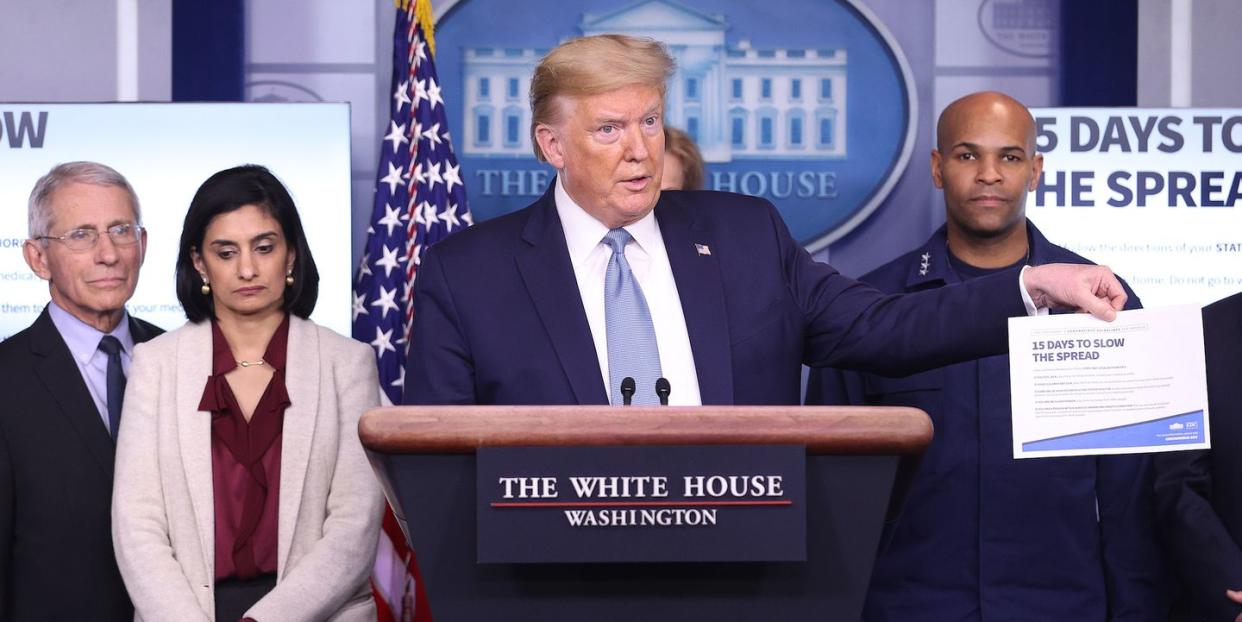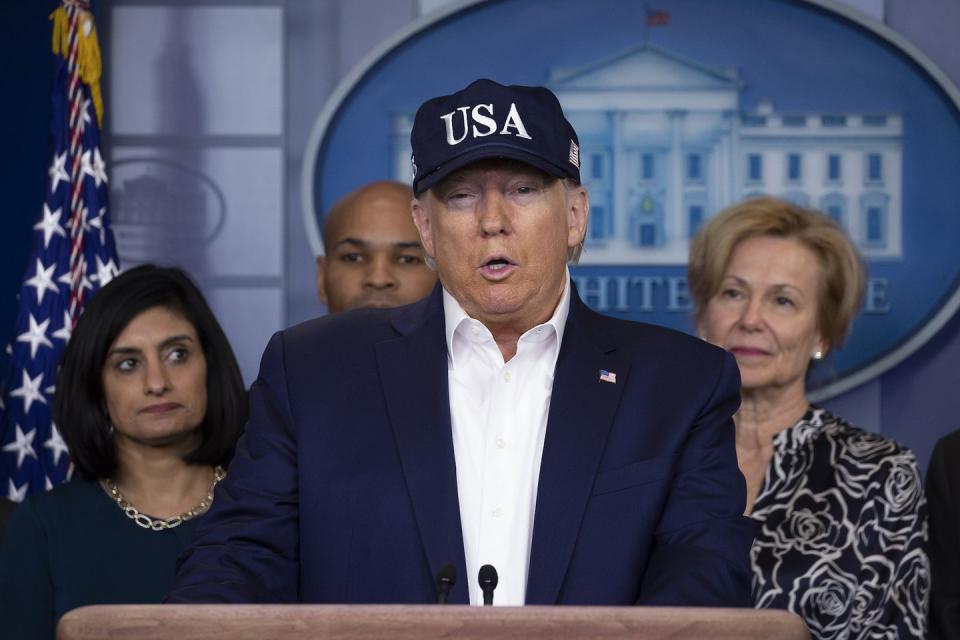After a Brief Burst of Sanity, Trump Is Back to Abnormal on the Coronavirus Response

After a brief brush with sanity, the President of the United States has returned to form. Gone is the fleeting sober analysis from a White House press conference on Monday, in which Donald Trump acknowledged that the novel coronavirus will disrupt our lives for months, that there will be many, many more cases, and that the health of the stock market—pretty much his only concern up to this point—will now have to take a back seat. By Tuesday morning, he was back to screaming at Democratic state governors on Twitter about "the Chinese Virus," because all things are destined to become a nationalist drum to beat in the hopes it will drown out reality.
The reality is that the United States has screwed this up so far, but there is still time to avoid Italy's fate. One of our main failures has been our botched testing program. Put simply, the U.S. has scarcely tested anyone. It's hard for anyone to get a test, including frontline healthcare workers, some of whom have to be pulled out of service as a precaution, which in turn puts more strain on the system. The shortage of test kits in the eight weeks since the virus first arrived here was not unavoidable. We now know that early on, the Centers for Disease Control rejected a World Health Organization-approved test developed by German scientists, opting to develop their own—only to first come up with a flawed test.
The proof that we could have done better is that South Korea, which experienced its first case one day before the United States did on January 21, has played things very differently.
Similar plot of South Korea vs US #COVID19 test data today @nytimes; it includes more recent CDC data, the cumulative N of tests 55 days after each country's 1st patient was diagnosed, confirmed cases, and has a different Y-axis display from mine https://t.co/UHKq5umcSy pic.twitter.com/VGr5e1s3XE
— Eric Topol (@EricTopol) March 17, 2020
Around the time that the United States had tested 11,000 people total, South Korea was testing 10,000 a day. By March 4, according to Eric Topol, the South Koreans were testing 18,000 people a day. The population over there is around 51 million. In the United States, it's 327 million. That comes out to 125 tests for every million Americans, which places the U.S. behind Greece and the Czech Republic. Again: these two countries ran into this problem at almost exactly the same time. This is not a pretty picture for the administration run by one Donald J. Trump, who spent the lion's share of that eight-week period downplaying the threat, musing the virus could disappear miraculously, suggesting people were going to work after contracting the virus and it was no big deal, and continually declaring we were on the cusp of having a vaccine available to the public.
None of this was true, and none of it was helpful, and none of it was the kind of thing coming out of governments—like South Korea's, or Hong Kong's, or Singapore's—that have managed this crisis well. While the picture is still a bit murky, it looks like Trump's best move may have shutting down travel from China early, which theoretically bought the U.S. some time to roll out the best preparatory regime possible. Instead of test kits and ventilators and masks, however, we manufactured bullshit. Less than a week ago, Trumpworld would not commit to cancelling future rallies—exactly the kind of large gathering public health experts had been saying should be called off.
Meanwhile, it's possible some governors are unhappy with the president because of a phone call Monday morning on which he seemed to suggest they're on their own when it comes to acquiring ventilators. Having states jump into a free-for-all to get ahold of pandemic-response resources is not really an ideal situation. Even the staunchest libertarian or federalist would probably grant that this task is at the core of what the federal government is designed to do. The president's beef with New York Governor Andrew Cuomo may be tied to Cuomo's call for Trump to engage the Army Corps of Engineers in building field hospitals to prepare for a surge in cases that could overwhelm our healthcare infrastructure. Along with a shortage of test kits and ventilators, we've also got a shortage of ICU beds.
Democratic leadership, meanwhile, has risen to the occasion with the kind of half-baked deficit-scold incrementalism we've all grown to know and love. As Michael Grunwald laid out in Politico Tuesday, Speaker of the House Nancy Pelosi has examined a situation in which she has complete leverage over the president and decided to secure paid sick leave for just one in five American workers.

At a time when Mitt Romney (!) is calling for the federal government to send American adults a check for $1,000, no questions asked—eat your heart out, Andrew Yang—the Democrats are stuck in Simpson-Bowles mode and will probably go along with the administration's push for a payroll tax cut. Just give people money, man. That $800 billion Trump administration proposal does outline some help for small and medium-sized businesses who will be crushed by a collapse in demand, as well as the airline and hospitality industries more broadly. But in a country with an actual party of the political left, we'd be seeing a push for a moratorium on rent, utility, and other payments on the basis that so many people and businesses simply have no money coming in. In France, they've already taken on some of these measures as applied to small businesses.
It seems that both Trump and Pelosi still have not come to grips with the fact that this could be a social and economic disruption on par with the Great Recession if we do not rise to the occasion with early, preventive action on both the public health and economic sides. We should be sending people checks at the very least, and declaring a suspension of rent payments—and evictions!—soon thereafter. The Netherlands is developing contingencies for its legal weed market with an eye on the public health, while we drag our feet on manufacturing test kits and ventilators. This is no time for the kind of American exceptionalism—d.b.a. arrogance—we've so far been practicing.
You Might Also Like

